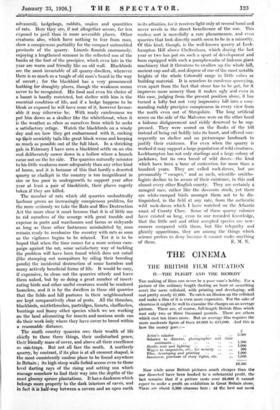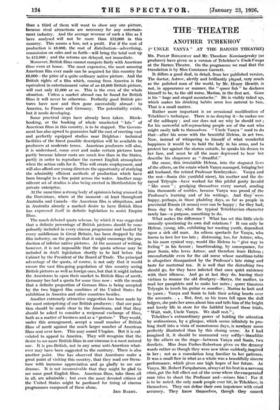THE CINEMA
THE BRITISH FILM SITUATION
II.--THE PLIGHT AND THE REMEDY THE making of films can never be a pour man's hobby. For a picture of the ordinary length (lasting an hour or something over) the mere celluloid, with printing and developing, will cost pretty nearly £1,000. To catch an illusion on the celluloid and make- a film of it is even more expensive. For the sake of clearness it might be well to examine the charges on an average picture. There are, of course, full-length British films which cost only two, or three thouiand pounds. There are others which cost ten tunes .more.. But an average film requires the more moderate figure of from £8,000 to £15,000. And this is how the money goes :—
Actor's salaries .. 3,500 Salaries to director, photographer and their assistants.. .. .. • . .. 1,500 Studio rent and lighting .. .. 1,000 Wages to carpenters, etc., for scenery . .. 500 Film, developing and printing .. .. • • 1,000 Insurance, purchase of story rights, etc. .. 1,000
£8,500 Now while some British pictures much cheaper than the one dissected have been booked to a substantial profit, the fact remains that if a picture costs over £6,000 it cannot expect to make a profit on exhibition in Great Britain alone. There are about 3,500 cinemas here : at the best not more
than a third of them will want to show any one picture, because rival attractions are necessary for any entertain- went industry. And the average revenue of such a film as I have analysed will not be more than £12,000 in this country. This means a loss, not a profit. For if the cost of production is £8,000, the cost of distribution—advertising, commission on sales and so forth—will bring the total cost up to 212,000 ; and the returns are delayed, not immediate.
Moreover, British films cannot compete fairly with American films even at home. The most expensive, the most amusing American film ever made can be acquired for this country for £8,000—the price of a quite ordinary native picture. And the British rights of a film which, coming from America is the equivalent in entertainment value of an £8,000 British picture, will cost only £1,000 or so. This is the crux of the whole situation. Unless a market abroad can be found for British films it will never be otherwise. Perfectly good British pic- tures have now and then gone successfully abroad : to America, to France and Germany. The potentiality exists, but it needs developing.
Some practical steps have already been taken. Block- booking, or the booking of whole unselected " lots " of American films in this country, is to be stopped. The Govern- ment has also agreed to guarantee half the cost of erecting vast and perfectly equipped studios near Brighton : technical facilities of the finest possible description will be available to producers at moderate terms. American producers will also, it is understood, come over and make certain pictures here partly because labour costs are much less than in the States, partly in order to reproduce the correct English atmosphere when the action calls for it. This will create employment, and
will also afford our young directors the opportunity of studying the admirably efficient methods of production which have been brought to a fine point across the water. Another mag- nificent set of studios is also-being erected in Hertfordshire by private enterprise.
At the same time a strong body of opinion is being aroused in the Dominions, where at the moment—at least throughout Australia and Canada—the American film is ubiquitous, and in Australia already a marked desire to have British films has expressed itself in definite legislation to assist Empire films.
The much debated quota scheme, by which it was suggested that a definite percentage of British pictures should be com- pulsorily included in every cinema programme and booked by every middleman in Great Britain, has been dropped by the film industry, on the grounds that it might encourage the pro- duction of inferior native pictures. At the moment of writing, however, it is not impossible that the quota scheme may be included in draft legislation shortly to be laid before the Cabinet by the President of the Board of Trade. The principal advantage of the quota, of course, is not only that it would ensure the vast film-going population of this country seeing British pictures as well as foreign ones, but that it might induce the Americans to open their market to British films of merit. Germany has had a quota for some time now : with the result that a definite proportion of German films is being accepted by the two biggest film combines of the United States for exhibition in America and other countries besides.
Another extremely attractive suggestion has been made by the most enterprising of our British producers : that our posi- tion should be made clear to the Americans, and that they should be asked to consider a reciprocal exchange of films, both as a matter of business and as a " gesture." They would, under this arrangement, accept a small number of British films of merit against the much larger number of American films sent over here. This may sound Utopian. But it is cal- culated to appeal to America. They will recognize that the desire to see more British films in our cinemas is a most natural one. It is pro-British, not in any sense anti-American what- ever may have been suggested to the contrary. There is also another point. One has observed that Americans make a great point of visiting this country, that they read our litera- ture with immense appreciation and go gladly to see our dramas. ' It is not inconceivable that they might be glad to See some good English films. American films, take them all in all, are idmirable ; but even the most devoted citizen of the United States might be pardoned for tiring of cinema programmes composed of these alone.
Ills BARRY.











































 Previous page
Previous page